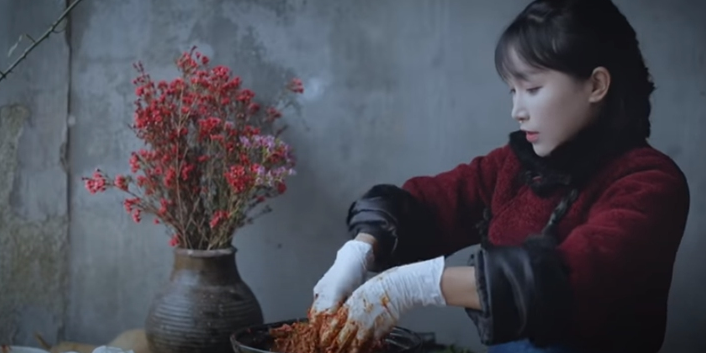(单词翻译:单击)
Li Ziqi, a famous Chinese food and rural-life vlogger with 14 million followers on YouTube, recently found herself sucked into this cultural battle after posting a several-minute-long cooking video on Saturday in which a dish that appears very similar to Korean pickled vegetables appeared.
中国美食和乡村生活博主李子柒在Youtube上拥有1400万粉丝,近期因其1月9日上传的一段视频陷入“文化争论”中。该视频中出现的一道菜与韩国泡菜较为相似。
Since Li Ziqi tends to remain quiet during her videos to allow the visuals speak for themselves, viewers began debating what type of picked vegetables she had made, with some saying it was South Korean pickled vegetables and others saying it was a variety of Sichuan pickled vegetables.
带着自己的一贯风格,李子柒在视频的全程中话很少,因此观众们开始争论她制作的是哪种泡菜,有人说这是韩国泡菜,而有些则说是四川泡菜。
Shortly after her video was uploaded on Saturday, Koreans flooded the comments section on YouTube and Facebook, criticizing her for misrepresenting the traditional Korean dish as Chinese.
视频9日上传后不久,韩国网民就涌入了YouTube和Facebook的评论区,批评李子柒把传统的韩国菜误传为中国菜。

"I'm not saying anything about making it, but shouldn't you at least write that it's a traditional Korean food? When I saw the cabbage split in half I thought, 'no way,' but after seeing it being seasoned, I couldn't believe my eyes," read one Korean comment.
“做泡菜我没意见,但你是不是至少该写明这是一道韩国传统食物?当我看到白菜被劈成两半的时候,我在想‘不能啊’,但看到她给白菜加作料后,我简直不敢相信自己的眼睛,”一位韩国人这样说。
While China has its own pickled vegetable dish—pao cai—the preparation method and ingredient selection differs from kimchi. The choice of ingredients and method shown in Li's video were very similar to that of kimchi.
虽然中国有自己的泡菜,但中国泡菜的制作方法和配料选择与韩国泡菜不同。李子柒视频中所展示的食材选择和方法与韩国泡菜非常相似。
"As a Chinese from the Korean ethnic group, when I see a Sichuan person (Li Ziqi) making pickled vegetables, I wouldn't care about who invented this dish, but would just be surprised, 'Huh? You eat cabbage like this too!' This feeling increases my closeness to people in Sichuan province without any hostility. However, the situation is completely different for South Koreans," another netizen posted on Zhihu.
“我是朝鲜族中国人,我在看四川人(李子柒)在做泡菜时,不会在意这道菜是谁发明的,只会惊讶,‘嗯?你也这样吃大白菜!’这种感觉增加了我和四川人的亲密感,没有敌意。不过,韩国人可能不这么想。”


